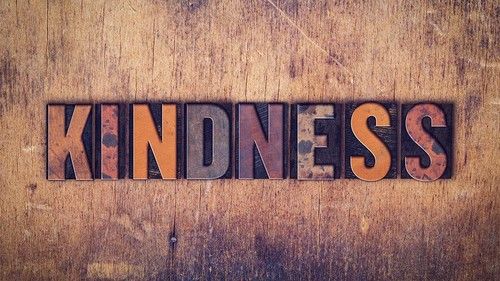Be Kind | Response to Yesterday's Sermon

Church family, my intention is not to repreach Pastor Noah's sermon from August 9, 2020. You can watch it or listen to it here. I was so moved yesterday by the Word, I'm compelled to come here kind of unload on you some thoughts.
How have we been unkind? Three ways, and I'll explain each one.
How have we been unkind? Three ways, and I'll explain each one.
- The pursuit of theological purity and unanimity at the expense of personal dignity.
- Imposing our personal convictions and interpretations on others as a litmus test for spirituality.
- Letting our own wounds and hurts from our past dictate how we treat people in the present.
The pursuit of theological purity and unanimity at the expense of personal dignity.
If you know me, you know that I am a man of theology. I have spent most of my adult life studying the Word, reading books, listening to men and women who are beasts in the Word, and bouncing things back and forth with my trusted Christian friends. In fact, if I could be completely honest, I struggle with things like small talk because I'd rather talk about something theological.
I know... I'm a nerd.
But, I say that to say this: I love theological purity. I pursue it in my personal life, therefore I understand the importance of it in the larger life of the Church. I think every believer should pursue this purity in their personal lives.
Where this sours is when we reach for theological unanimity within a local church. First off, let's be real. It's not attainable unless your church is comprised of five people and four of them are your immediate family. Even then it's difficult. But what happens is you have sects and factions form within the church of like-minded people on particular theological issues. To some extent, this happens naturally. But at times and with some people, instead of being content with differences, it becomes their mission to bring everyone over to their understanding of an issue.
[To be clear, I'm not talking about non-negotiable Christian beliefs like the virgin birth, or the sinless life of Jesus. However, even in these kinds of disagreement, kindness is still important.]
Things get unkind when agreement cannot be reached. It's not usually some face-to-face disagreement. It manifests in gossip and slander. It gets talked about around the dinner table. It gets talked about at lunch with a friend. All of these side-conversations have a goal of gathering people to your point of view. It's similar to drafting troops. Even if you're right and they're wrong, and even if everyone is a steel vault and it never goes anywhere else, all gossip and slander is unkind. It creates factions and divisions that ultimately hurt people and harm the advance of the Kingdom.
The solution is get over your need for everyone around you to agree with you. Understand that your mission to bring every believer over to your way of believing is perhaps more about control than Truth. Allow people the dignity of having different beliefs and thoughts about issues. and let them sharpen you as much as you want to sharpen them.
I know... I'm a nerd.
But, I say that to say this: I love theological purity. I pursue it in my personal life, therefore I understand the importance of it in the larger life of the Church. I think every believer should pursue this purity in their personal lives.
Where this sours is when we reach for theological unanimity within a local church. First off, let's be real. It's not attainable unless your church is comprised of five people and four of them are your immediate family. Even then it's difficult. But what happens is you have sects and factions form within the church of like-minded people on particular theological issues. To some extent, this happens naturally. But at times and with some people, instead of being content with differences, it becomes their mission to bring everyone over to their understanding of an issue.
[To be clear, I'm not talking about non-negotiable Christian beliefs like the virgin birth, or the sinless life of Jesus. However, even in these kinds of disagreement, kindness is still important.]
Things get unkind when agreement cannot be reached. It's not usually some face-to-face disagreement. It manifests in gossip and slander. It gets talked about around the dinner table. It gets talked about at lunch with a friend. All of these side-conversations have a goal of gathering people to your point of view. It's similar to drafting troops. Even if you're right and they're wrong, and even if everyone is a steel vault and it never goes anywhere else, all gossip and slander is unkind. It creates factions and divisions that ultimately hurt people and harm the advance of the Kingdom.
The solution is get over your need for everyone around you to agree with you. Understand that your mission to bring every believer over to your way of believing is perhaps more about control than Truth. Allow people the dignity of having different beliefs and thoughts about issues. and let them sharpen you as much as you want to sharpen them.
Imposing our personal convictions and interpretations on others as a litmus test for spirituality
I promised myself that I would never use this issue to make a point, but it's just too obvious to let it go. Not every believer does this, but I have a sneaky suspicion that more do it than will admit. This point is illustrated well by the mask/no mask issue that is raging in culture right now. I've listened in on conversations of believers on both sides of the issue where the use or non-use of a mask somehow becomes an arbiter of whether they are faithful Christians.
Friends, we cannot do this. But let's take it beyond face masks. We've been doing this for way longer on other issues. Remember when we were only testing people's spirituality over the issue of alcohol without drunkenness, or no alcohol at all?
I miss those days...
...Oh, I've just been informed that we still do that. Nevermind.
The point is this. It's unkind to judge a person's spirituality with these kinds of litmus tests. They're unfair, they don't take into account the larger story of a person's whole journey. Sure they had a beer at dinner, then wore a mask into Walmart. Did you know that they led three people to the Lord last week? No? Oh, you just saw them at Applebee's and Walmart yesterday. Ok. And how many people have you shared your faith with lately?
Hmmm.
Friends, we cannot do this. But let's take it beyond face masks. We've been doing this for way longer on other issues. Remember when we were only testing people's spirituality over the issue of alcohol without drunkenness, or no alcohol at all?
I miss those days...
...Oh, I've just been informed that we still do that. Nevermind.
The point is this. It's unkind to judge a person's spirituality with these kinds of litmus tests. They're unfair, they don't take into account the larger story of a person's whole journey. Sure they had a beer at dinner, then wore a mask into Walmart. Did you know that they led three people to the Lord last week? No? Oh, you just saw them at Applebee's and Walmart yesterday. Ok. And how many people have you shared your faith with lately?
Hmmm.
Letting our own wounds and hurts from our past dictate how we treat people in the present.
I'm not sure that this one isn't the most damaging of the three. Have you ever been hurt and then proceeded to make a internal vow? "I'll never let another ________ hurt me again." Or, "I'll never do __________ again." These kinds of internal vows may seem harmless in the moment, but depending on the severity of the hurt they actually wield power over your present in unexpected, harmful ways. The internal vow becomes a lower-case savior of sorts. In many cases you become an evangelist of your internal vow. You'll never do _______ again, and neither should anyone else.
Now if your blank is heroin, then of course you should definitely evangelize others away from doing heroin. But if you say, "I'll never trust a man again," or, "I'll never let another church hurt me," then you have a problem. The problem manifests in how you evangelize others to feel the same way as you do.
When an internal vow that has roots in hurts and wounds becomes a savior, you start telling others about it. It begins telling us how to treat others. And suddenly we're not led by the Holy Spirit, but another spirit in whom we've trusted to protect us. If it's not Jesus telling us how to treat others, we will invariably hurt people in similar ways that we've been hurt. We will be unkind to others when what they say and do treads too closely to the boundary our internal vows have drawn for us.
Maybe our unkindness serves as evidence that one or all of these things maybe at work in our lives. I'm sure at one point or another, all of us would agree that we've been one or all three of these people; and this certainly isn't an exhaustive list of reasons for unkindness. All I'm suggesting in light of Sunday's sermon is that we test ourselves against the kindness of Jesus. Don't test yourself against my kindness or anyone else's... except Jesus. Where are we failing? Where are we succeeding? How much of the grief that we endure is linked to the consequences of our own unkindness or the unkindness of others?
Think about these things as you journey with Jesus this week.
Grace and peace to all of you.
Now if your blank is heroin, then of course you should definitely evangelize others away from doing heroin. But if you say, "I'll never trust a man again," or, "I'll never let another church hurt me," then you have a problem. The problem manifests in how you evangelize others to feel the same way as you do.
- You tell other women to be cautious of all men because they all only want one thing from you.
- You tell as many people as you can that church is optional because it's full of hypocrites and hurtful people.
When an internal vow that has roots in hurts and wounds becomes a savior, you start telling others about it. It begins telling us how to treat others. And suddenly we're not led by the Holy Spirit, but another spirit in whom we've trusted to protect us. If it's not Jesus telling us how to treat others, we will invariably hurt people in similar ways that we've been hurt. We will be unkind to others when what they say and do treads too closely to the boundary our internal vows have drawn for us.
Maybe our unkindness serves as evidence that one or all of these things maybe at work in our lives. I'm sure at one point or another, all of us would agree that we've been one or all three of these people; and this certainly isn't an exhaustive list of reasons for unkindness. All I'm suggesting in light of Sunday's sermon is that we test ourselves against the kindness of Jesus. Don't test yourself against my kindness or anyone else's... except Jesus. Where are we failing? Where are we succeeding? How much of the grief that we endure is linked to the consequences of our own unkindness or the unkindness of others?
Think about these things as you journey with Jesus this week.
Grace and peace to all of you.
Posted in Pastor Shane\'s Blog
Recent
Archive
2023
2020
2019
July
August
September
October
2018
November

No Comments